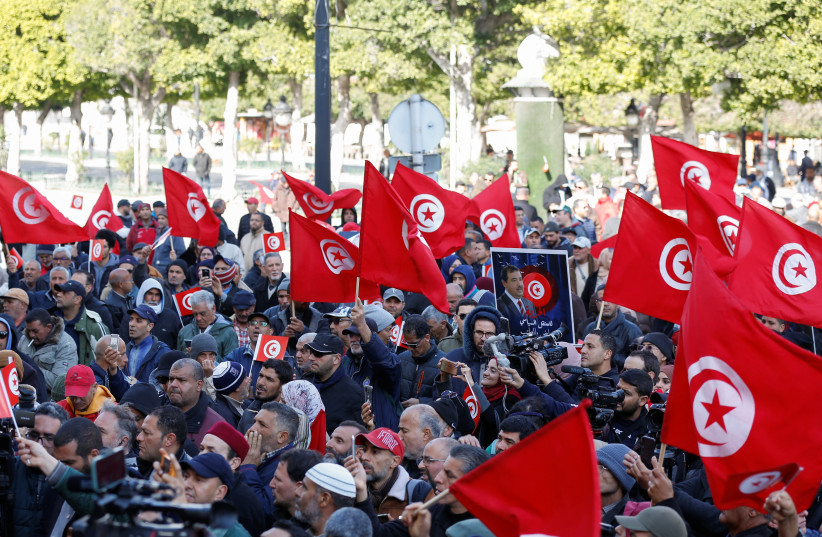Tunisia and Sudan started taking steps toward democracy over the last decade and a half. Hopes were high for both North African countries, but current developments raise questions for the region.
Tunisia is where the Arab Spring began in 2011. The country – with a population of roughly 12 million people – is located just over 100 km. southwest of Sicily across the Mediterranean. It was ruled by the Zine El Abidine Ben Ali regime from 1987 to 2011, ostensibly as a secular country, which fit the model of national Arab regimes that came to power after colonial rule.
Ben Ali was forced from power in January 2011 after the self-immolation of Tunisian fruit seller Mohamed Bouazizi. This set off the Arab Spring as protests spread to Egypt. The changes in Tunisia led to a new democratic government and elections in October of that year. Tunisia was seen as a successful model of what some hoped the Arab Spring could bring.
Yet over the last decade, the country has been at the center of regional disputes amid rising authoritarianism. This was part of a larger struggle between those who backed Turkey and Qatar’s views of the region – often parties linked to the Muslim Brotherhood – and those who backed a view closer to Egypt, the United Arab Emirates and Saudi Arabia.
The conflict in Libya, neighboring Tunisia, had its effects as well. Eventually, in 2019, an election in Tunisia brought Kais Saied, a retired academic, to power after he defeated a media mogul. Critics, such as the Ennahda movement, claimed the country was heading toward “dictatorship.” Ankara’s pro-AKP media alleged the same thing.

The current focus in Tunisia is on protests against migrants who often use the country as a transit point from Sub-Saharan Africa to Europe.
Overall, the perception is that the government is seeking to distract from other issues by focusing public anger on migrants. Some reports characterize this as “anti-black racism surfaces in an African country,” which seems to confuse the fact that demographically and historically, the Arab and Berber-speaking North Africa is quite different from the Sahel or the Democratic Republic of the Congo.
The future of democracy in Tunisia – and whether it will turn more authoritarian – are key questions, which may also influence developments in Libya and Algeria, where civil conflicts continue. It is possible that the new reconciliation between Turkey and Egypt will impact both.
Sudan, facing a democratic crisis
Sudan, with a population of around 45 million, is also facing a democratic crisis. The 2019 overthrow of Omar al-Bashir, the Islamist dictator who was accused of genocide, created an opportunity to transform Sudan from 30 years of conflict to a more progressive state.
The overthrow of Bashir also led to the rise of Abdel Fattah al-Burhan, an army general. As in Tunisia, the coup was supposed to be a quick transition to civilian rule. However, unlike Tunisia, the military has remained in control.
Al-Burhan headed up a Transitional Sovereignty Council and then seized power in 2021, and has become close to the Sisi government in Egypt and the Gulf. In September 2021, the Sudanese rulers accused elements of Bashir’s old regime of attempting a coup.
There are ongoing transition talks aimed at shifting Sudan to civilian rule. Al-Burhan has said he wants a civilian-led government. He reiterated that pledge this week.
“During our history, the armed forces have supported dictatorial governments, and we want to put an end to that,” al-Burhan, said in a speech to soldiers on Sunday.
The big question now is whether the military will fully step away from politics or continue to loom in the background, ready to remove a civilian leadership that is not in line with its views.
This seems to be the concern in Tunisia as well, although in Tunisia’s case, it is an authoritarian civilian-led government that is in charge. Both countries continue to sit at a crossroads; both are key areas of struggle between the political Islamic ideologies of the region that have underpinned politics for decades, and the military rule and other forms of government that are part of the mosaic of rule in the Middle East.
Both these states also matter because they link key areas of North Africa with both Europe and the rest of the Middle East. Sudan has in the past been both an area of conflict as well as a place that regimes such as Iran, terrorist groups like al-Qaeda and others have sought to exploit.
Similarly, Tunisia matters as a linchpin of security in North Africa, sitting between the civil war in Libya and the regime in Algeria. In the larger context, with protests against authoritarianism in Israel continuing, the current situation could be seen as part of a wider regional trend regarding where democracy and institutions are headed in the Middle East.
